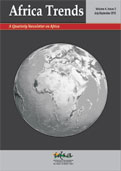The Africa-ICC Trouble: A Case for Systemic Reforms
The African notifications of intention to quit ICC have yet again highlighted the need for systemic changes in the current world order. Only a non-discriminatory, democratic and inclusive UNSC reflecting the contemporary world could address these challenges and questions.
- Saurabh Mishra
- October-December 2016











